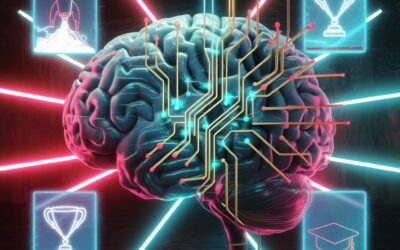The skills required for success in the workplace are constantly changing. As we navigate through 2024 and look towards the future, it's crucial to understand which skills are most valuable now and which will become increasingly important in the years to come. This article explores the essential skills that professionals should focus on developing to stay competitive and thrive in the modern workplace and beyond.
The Changing Landscape of Work
Before going into specific skills, it's important to understand the context in which these skills are becoming valuable. The workplace is undergoing significant transformations driven by factors such as:
1. Technological advancements, particularly in artificial intelligence and automation
2. Globalization and increased connectivity
3. Changing work models, including remote and hybrid work arrangements
4. The growing importance of sustainability and social responsibility
5. Rapid pace of change across industries
These factors are reshaping job roles, creating new opportunities, and rendering some traditional skills obsolete. As a result, professionals must adapt and acquire new competencies to remain relevant and valuable in the job market.
Core Skills for the Modern Workplace
1. Analytical Thinking
Analytical thinking has emerged as the most crucial core skill identified by companies, accounting for 9.1% of reported core skills. This skill involves the ability to examine and break down complex problems, identify patterns, and draw logical conclusions based on available data.
Why it's important:
- Enables data-driven decision-making
- Helps in problem-solving and strategy development
- Facilitates process optimization and efficiency improvements
How to develop it:
- Practice breaking down complex problems into smaller components
- Learn data analysis techniques and tools
- Engage in case studies and scenario-based learning
2. Creative Thinking
Ranked second in importance for 2023, creative thinking is predicted to have the fastest growth (73%) in demand over the next five years. This skill involves generating original ideas, thinking outside the box, and approaching problems from new angles.
Why it's important:
- Drives innovation and product development
- Helps in finding unique solutions to challenges
- Enhances adaptability in rapidly changing environments
How to develop it:
- Engage in brainstorming exercises regularly
- Practice lateral thinking techniques
- Expose yourself to diverse experiences and perspectives
3. Digital Literacy
As technology becomes increasingly integrated into every aspect of work, digital literacy has become a fundamental skill for professionals across all industries.
Why it's important:
- Enables efficient use of digital tools and platforms
- Facilitates remote work and digital collaboration
- Enhances productivity and communication
Key areas to focus on:
- Proficiency in cloud computing
- Understanding of data analysis tools
- Basics of cybersecurity
- Familiarity with industry-specific software and applications
4. Emotional Intelligence
Emotional intelligence (EQ) refers to the ability to recognize, understand, and manage emotions, both in oneself and others. This skill is crucial for promoting harmonious work environments and effective leadership.
Why it's important:
- Improves team dynamics and collaboration
- Enhances leadership capabilities
- Facilitates better customer relations and conflict resolution
How to develop it:
- Practice self-awareness and reflection
- Develop active listening skills
- Learn to recognize and respond to others' emotional states
- Seek feedback and work on areas of improvement
5. Critical Thinking
In an era of information overload and widespread misinformation, the ability to think critically and evaluate information based on evidence is more important than ever.
Why it's important:
- Helps in making informed decisions
- Enables effective problem-solving
- Protects against misinformation and biases
How to develop it:
- Practice questioning assumptions and seeking evidence
- Learn to evaluate sources of information
- Engage in debates and discussions on complex topics
- Develop logical reasoning skills
Emerging Skills for the Future
While the core skills mentioned above are crucial for success in the current workplace, several emerging skills are expected to become increasingly important in the near future.
1. AI and Big Data Skills
With the rapid advancement of artificial intelligence and the growing importance of data-driven decision-making, skills related to AI and big data are expected to see significant growth in demand, with a projected 60% increase by 2027.
Key areas to focus on:
- Machine learning and deep learning
- Data visualization and interpretation
- AI ethics and responsible AI development
- Big data analytics and management
2. Adaptability and Flexibility
Given the rapid pace of change in the workplace, the ability to adapt to new situations, technologies, and work environments is becoming increasingly valuable.
Why it's important:
- Enables professionals to thrive in dynamic work environments
- Facilitates smooth transitions during organizational changes
- Enhances resilience in the face of challenges
How to develop it:
- Embrace change and seek out new experiences
- Practice stepping out of your comfort zone
- Develop a growth mindset
- Learn from failures and setbacks
3. Communication and Collaboration in Digital Environments
As work environments become more diverse and distributed, effective communication and teamwork skills, particularly in digital settings, are crucial.
Key areas to focus on:
- Virtual presentation skills
- Asynchronous communication techniques
- Cross-cultural communication
- Digital collaboration tools and best practices
4. Leadership and Social Influence
Leadership skills are no longer relevant only for top positions but are increasingly important for every individual within an organization.
Why it's important:
- Facilitates career advancement
- Enhances team performance and motivation
- Drives organizational change and innovation
Key areas to focus on:
- Inspirational leadership
- Inclusive leadership practices
- Change management
- Conflict resolution and negotiation
5. Curiosity and Lifelong Learning
With the rapid pace of change in technology and work practices, a mindset of continuous learning is essential to stay relevant in the future workplace.
Why it's important:
- Enables professionals to stay up-to-date with industry trends
- Facilitates career transitions and growth
- Enhances problem-solving and innovation capabilities
How to develop it:
- Cultivate a growth mindset
- Set personal learning goals
- Engage in diverse learning experiences (e.g., online courses, workshops, reading)
- Seek out mentors and learning opportunities within your organization
6. Time Management and Productivity
Efficient time management is crucial for productivity, regardless of work setting. As work environments become more flexible and autonomous, the ability to manage one's time effectively becomes even more important.
Key areas to focus on:
- Prioritization techniques
- Productivity tools and methodologies
- Work-life balance strategies
- Effective delegation and task management
7. Prompt Engineering for AI
As AI becomes more prevalent in various industries, the ability to effectively communicate with and guide AI systems through precise prompts is becoming increasingly valuable.
Why it's important:
- Enhances the effectiveness of AI tools and applications
- Enables professionals to leverage AI for improved productivity
- Facilitates the development of AI-powered solutions
How to develop it:
- Learn the basics of natural language processing
- Practice crafting clear and specific prompts for AI systems
- Understand the limitations and capabilities of different AI models
- Stay updated on advancements in AI and language models
The Importance of Upskilling and Reskilling
Given the rapid evolution of required skills in the workplace, continuous learning and development have become essential for career success. Companies are recognizing this need, with 82% planning to invest in on-the-job learning and training programs for their employees.
Professionals should take advantage of these opportunities and also invest in their own skill development through:
1. Online courses and certifications
2. Industry conferences and workshops
3. Mentorship programs
4. Cross-functional projects and job rotations
5. Self-directed learning and experimentation
Balancing Technical and Soft Skills
While many of the emerging skills are technical in nature, it's important to note that soft skills remain crucial for success in the workplace. A well-rounded professional should strive to develop both technical and soft skills to maximize their value and adaptability in the job market.
Technical skills provide the foundation for performing specific job functions, while soft skills enable effective collaboration, communication, and problem-solving across various contexts.
The Role of Education and Training Institutions
As the demand for these skills grows, education and training institutions play a crucial role in preparing the workforce of the future. There is an increasing need for:
1. Updated curricula that reflect current industry needs
2. Practical, hands-on learning experiences
3. Collaboration between educational institutions and industry partners
4. Flexible and modular learning options to facilitate lifelong learning
5. Focus on developing transferable skills alongside domain-specific knowledge
Conclusion
The workplace of the future will require a diverse set of skills that span both technical abilities and soft skills. Analytical and creative thinking, digital literacy, emotional intelligence, and critical thinking form the core skills that professionals should focus on developing. Emerging skills such as AI and big data proficiency, adaptability, digital communication and collaboration, leadership, and continuous learning will become increasingly important in the coming years.
By investing in these skills and adopting a mindset of lifelong learning, professionals can position themselves for success in the ever-evolving job market. Organizations, educational institutions, and individuals all have a role to play in fostering the development of these crucial skills to create a workforce that is prepared for the challenges and opportunities of the future.
As we navigate through rapid technological advancements and changing work paradigms, the ability to adapt and continuously learn will be the ultimate skill that ensures long-term success and relevance in the workplace. By embracing these changes and proactively developing the skills outlined in this article, professionals can not only survive but thrive in the dynamic and exciting future of work.

























